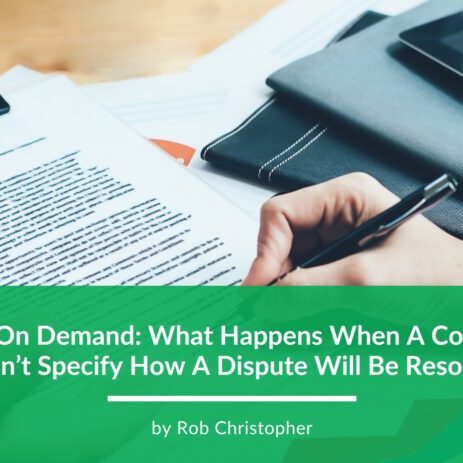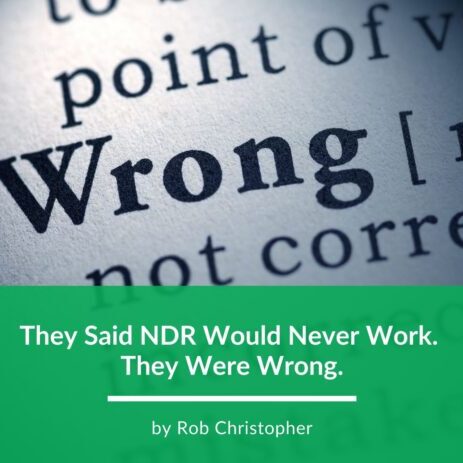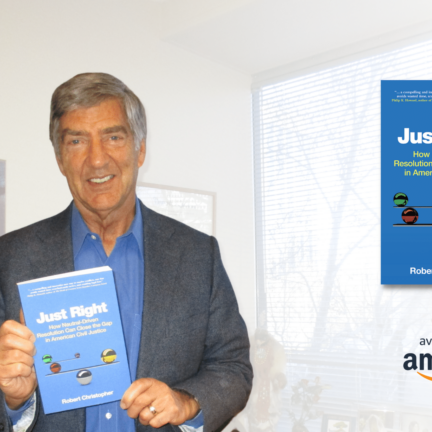Litigation Nightmares

I’ve been working on my upcoming book about our neutral-driven dispute resolution. It begins with a litigation nightmare from my own law practice about a start-up drug company who disputed a bill from a testing lab after the study results weren’t favorable. Read the excerpt to see what happened.
The start-up drug company’s CEO was the kind of person who wants everyone to know he’s the smartest person in the room. To make matters worse, he was also an attorney. In my experience, attorneys with this type personality combine a unique blend of ego, myopia, and self-interest that drives them to continue pushing an aggressive course of action well beyond the point where it should be obvious that things aren’t going as planned. In hindsight, I’m pretty sure that’s what happened here.
After the first round of letters, calls, and unreasonable demands from the other side, I warned my clients [the lab] that unless we could get a neutral mediator to help the parties settle early, their legal fees in this case likely would exceed the $47,000 at stake for them. My clients were unwilling to walk away. They were tired of taking losses on valid studies when clients didn’t get the results wanted (an occupational hazard in their business). They were prepared, therefore, to take a stand for their business. All warnings out on the table, I agreed to continue representing them.
Shortly thereafter, the other side dismissed our side’s suggestion of early mediation and moved in federal district court for a preliminary injunction (in effect, a pre-trial ruling that it had a good case)… $12,000 in legal fees later – tick tock – the court denied the injunction… We took a breath and hoped for a new attitude, or at least some rationality, even if it were hidden behind the usual bluster of over-confident rhetoric from the other side. Unfortunately, they chose to double down on aggression. The fight was just getting started.
Next came the discovery wars. Discovery is the formal pre-trial lawsuit process by which parties request and obtain evidence and other relevant information from the other side, including depositions, documents and other tangible items, written answers to questions, electronic information, and requests to stipulate that certain facts are undisputed. Discovery is always partially insane. The combination of need, procedural weapons and rules, strategies to burden or retaliate, and competing egos inevitably inflate the process, even among attorneys with the best of intentions. This case was no exception. After a few months of written discovery nonsense including outright stalling, merit-less objections, a motion to compel answers, hearing postponements and, eventually, courtroom argument, my clients, to their credit, realized this had to stop – tick tock.
We’d already spent more than half of the $47,000 that we might win, while depositions (oral testimony transcribed into a book), trial preparation, pretrial motions, and trial still lay ahead. The painfully obvious truth was there was no way either side could be made whole financially. The parties finally agreed to mediate, just as our side had suggested six months and $25,000 earlier. We filed more briefs and all met with the mediator for a day, cutting a deal that no one liked for about $26,000 to be paid over time – tick tock.
The start-up failed as a company after making the initial down payment of $10,000.
The whole [litigation] process was largely waste, loss, futility, and wholly unwarranted when compared with what was at stake. I had done an outstanding job. I had given sound advice in my client’s best interests and had won when forced to fight. Yet my clients still ended up with a big net loss for their time, money and trouble. Our “justice” system had failed them, and I was struck for the umpteenth time by an overwhelmingly clear fact: Only a miniscule portion of the hours and money that each side put into the case, and a fragment of either side’s time and energy diverted from productive business, had anything to do with answering the core question in dispute: Who owed what to whom?
More to read
NDR on Demand: What Happens When a Contract Doesn’t Specify How a Dispute Will Be Resolved?
The best way to deter threats of litigation and minimize the costs, duration, and distractions of resolving any dispute is to put a dispute resolution clause specifying NDR — Neutral-Driven Resolution — in all your contracts BEFORE there is a problem. That means that if a dispute should arise between a business and a contractor,…
They Said NDR Would Never Work. They Were Wrong.
Many people are surprised by how effective NDR can be. Since publishing my book and speaking at events about NDR (Neutral-Driven Resolution), I’ve often been asked a simple question: Does it work? And if it really does lower the costs and the time it takes to settle common disputes, why doesn’t everybody know about…
“Morgan Hill author releases new book”
The Morgan Hill Times featured Rob’s new book in an article ahead of his “Meet the Author” night at Booksmart. “Legal disputes and conflicts cost businesses billions of dollars a year in lawyers’ fees, lost productivity, time and aggravation. A new book by Morgan Hill author Robert Christopher proposes an innovative, faster and simpler way…
Not All Disputes are Equal
Not all business and legal disputes are alike, and not all of them can be resolved in the same way. In writing my book Just Right: How Neutral-Driven Resolution Can Close the Gap in American Civil Justice, it was important to distinguish the types of common disputes for which NDR is most suitable. As readers…



